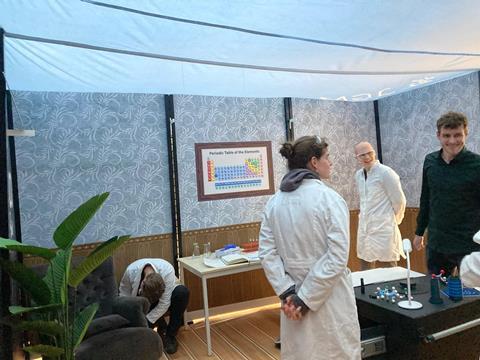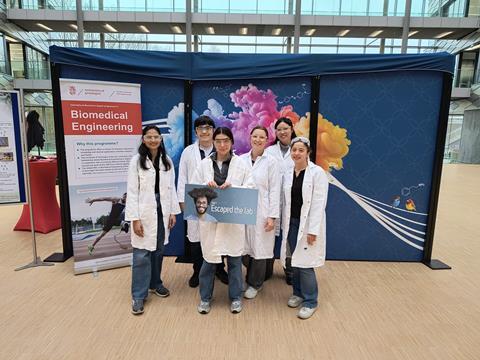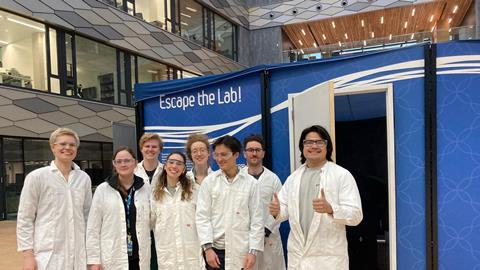By incorporating game-based learning in his courses, Michael Lerch provides his students with a new perspective on chemistry. ‘Turning complex concepts into something hands-on and fun like a puzzle, helps them to really understand the material.’
On a bright Tuesday morning, after a brief moment of confusion over the correct entrance, I finally found my way into the newly constructed Feringa Building of the University of Groningen. Just a few steps in, a large banner caught my eye. “Escape the lab!”, it boldly announced. The man responsible for this surprising slogan: Michael Lerch, assistant professor at the Stratingh Institute for Chemistry.
The banner refers to the escape game he has incorporated in his course ‘Molecules of Life’ for bachelor students in biomedical engineering. ‘Many students find chemistry too abstract. They lose interest and dismiss it as boring and irrelevant’, Learch explains his decision to bring game-based learning (GBL, see box) into the classroom. He admits that he was quite cautious about introducing GBL into his teaching. ‘I worried it might be distracting or even disruptive.’ Therefore, he decided to first gauge student reactions.

To introduce the concept and ease students into it, he started in their first tutorial with a previously reported Escape Game inviting them to solve puzzles about the life and work of 18th century chemist Nicolas Leblanc to activate their high school chemistry knowledge. After collecting feedback, he refined his approach and gradually began incorporating more GBL elements into his lectures.
Understand and remember
One of the ways he implemented GBL is by co-creating puzzles with students. ‘For me, it is more than just a teaching tool, it’s a way to make chemistry more tangible’, says Lerch. ‘I believe that when students take abstract, complex concepts and turn them into something hands-on and fun like a puzzle, they really start to understand and remember the material. True learning happens when you apply what you learned.’
Lack of representation
Another element that Lerch brings to his courses is a broader, more representative scope. ‘Today’s students come from a variety of cultural backgrounds, which can make them feel underrepresented in academic settings’, he says. This lack of representation is quite evident in most chemistry textbooks, which still predominantly feature achievements by white male scientists, offering little visibility to the contributions of others. To improve this, Lerch introduces students to successful chemists through assignments that require them to create portfolios of scientists from underrepresented groups. ‘In doing so, I hope to broaden their perception of who belongs in science and in chemistry’, he says.
Student survey
Developing these new concepts and approaches takes a lot of additional effort. However, Lerch explains that his overall teaching workload hasn’t really increased, since many of the puzzles are co-created with students. ‘GBL can be as simple or as complex as the teacher chooses to make it.’ That said, he admits that this year’s escape room, developed in collaboration with a game company did require extra time and coordination.
But what about the students, do they appreciate this new teaching style? ‘Responses have been mixed’, says Lerch. ‘Some really enjoy it, while others prefer the comfort of traditional lectures.’ He is eager to optimize its effectiveness and is planning a student survey to identify which GBL elements are most impactful. Lerch’s colleague professor Wiktor Szymanski, joins the conversation. They share an enthusiasm for GBL and Szymanski was one of the first to support Lerch in bringing it into the classroom. ‘I’m considering incorporating it into my own lectures for first-year pharmacology students’, Szymanski adds.
Walking around the escape room area, it is clear that the students did an impressive job creating all the puzzles. What seemed like a simple escape room at first glance turns out to be surprisingly challenging. To me, it felt a bit intimidating that most of the puzzles were based on fundamental chemistry concepts as they really put my basics to the test.
Game-based learning

Game-based learning (GBL) is an educational approach that combines gameplay with clear learning objectives. It requires balancing subject content with engaging game elements. Studies show that GBL boosts student motivation and supports the development of soft skills like communication, conflict resolution, and teamwork. One of its most valued aspects is the idea of ‘graceful failure’, where students can experiment, take risks, and learn from mistakes in a low-pressure environment.













Nog geen opmerkingen